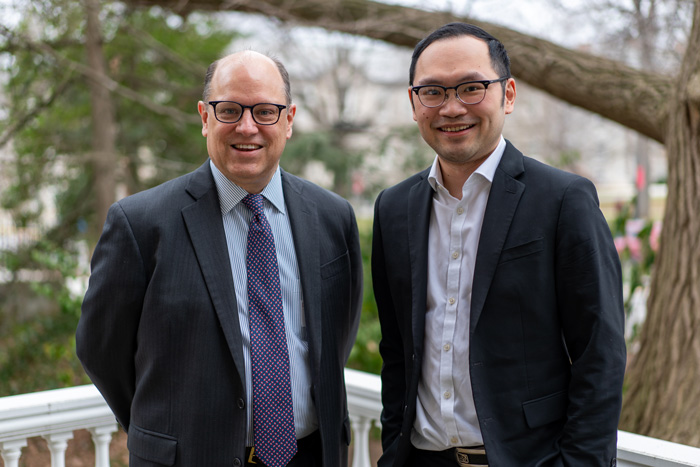Lazard’s Holcombe Green '92 and Jianan Yang '13 Come to Dickinson to Recruit for Careers in Investment Banking

Holcombe Green '92 (left) is the global head of private capital advisory at Lazard, and Jianan Yang '13 is a vice president in Green’s division.
Finance veterans speak with students about opportunities at the storied NYC firm
by Tony Moore
Lazard’s Holcombe Green '92 and Jianan Yang '13 recently returned to campus to speak to students interested in careers in finance, continuing Green’s continual engagement over the years with Dickinson students.
A member of Dickinson’s Board of Trustees, Green is the global head of private capital advisory at Lazard—the legendary investment house founded in 1848—while Yang is a vice president in Green’s division. Through an event facilitated by the Advising, Internships & Career Center, the pair visited to recruit members of the class of 2025 for Lazard’s summer 2024 Private Capital Advisory Analyst program in New York City.
And while they’re both on the same professional team and call Dickinson their alma mater, they look at the recruiting visit to Dickinson through slightly different lenses.
Looking for the Next Generation
“The first thing I would say is that I don’t think of recruiting Dickinson students as philanthropic—I am self-interested in this endeavor,” says Green, who returned to campus on a similar mission with Zoe Kaminski ’18 in 2021 and has now recruited two Dickinsonians into his team at Lazard. “Dickinson grads are smart, eager and energetic employees who have a good breadth of skills. So my bottom line is we have to recruit new college graduates into our business to continue to grow, and I think Dickinson graduates can compete for our positions with graduates of any of the other schools at which we recruit.”
For Yang, the inspiration—while similarly motivated by finding the best and brightest—is chiefly his desire to help current students get a leg up in his professional arena.
“When I was still on campus, there was no on-campus recruiting for investment banking roles,” he says. To make up for that, Yang spent a lot of time networking to break into Wall Street and says he benefited tremendously from conversations and referrals from Dickinson alumni in the industry. “I know how hard it is to get into investment banking from a non-core school. Now I have been in investment banking for 10 years and would love to give back and help Dickinson students as much as I can.”
Lazard now considers Dickinson a core school for recruiting talent, something for which Yang credits Green’s efforts. And he’s got some advice for students looking toward a career in the industry: “Dickinson alumni are always there to help you, but you need to be dedicated and prepare early.”
Keys to Success
While Yang was a double major in mathematics and international business & management at Dickinson, he nonetheless credits more than just the inherent skills those majors impart for his success.
“I would say the critical thinking and the ability to learn things quickly are quite important,” he says. “I didn’t realize the invisible value of that aspect of my education before investment banking, but the more time I’m in the industry, the more I have appreciated it.”
For Green, the value of the critical-thinking skills a Dickinson education instills likely wasn’t invisible, as he was a philosophy major. But for current students interested in investment banking, a philosophy major might seem to entail a stranger path into the profession.
“One might think philosophy to be a major that would not lead you to a career on Wall Street, but I have found it to create a strong foundation on which to build,” says Green, adding that his classes were very small and incredibly interactive. “This kind of small group debate and discussion is exactly what I do every day with clients and colleagues.”
Green—who continued on to the Yale School of Management after Dickinson—also credits his major for honing his ability to write and speak persuasively and effectively, a trait shared with his broader liberal-arts education.
“I spend most of my days with highly educated colleagues and clients, and the ability to communicate on many topics—the demonstration of interest in culture, the global geopolitical landscape, a wide array of economic activities—contributes to my ability to connect with business leaders on a professional and personal level,” he says. “And so I would say the best thing for me about a Dickinson education has been its longevity.”
He suggests students take classes across the curricular landscape and get to know their professors as well as they can, saying it’s impossible to overstate the importance or putting oneself out there.
“If you are an IB&M major, take English classes and classes in the hard sciences,” he says. “If you are a physics major, study a foreign language. You will find new relationships with fabulously well-educated faculty across the campus, and those will be some of the most rewarding interactions of your college experience. Those relationships are very hard to replicate in university environments and are what make Dickinson such a special place.”
TAKE THE NEXT STEPS
Published April 14, 2023